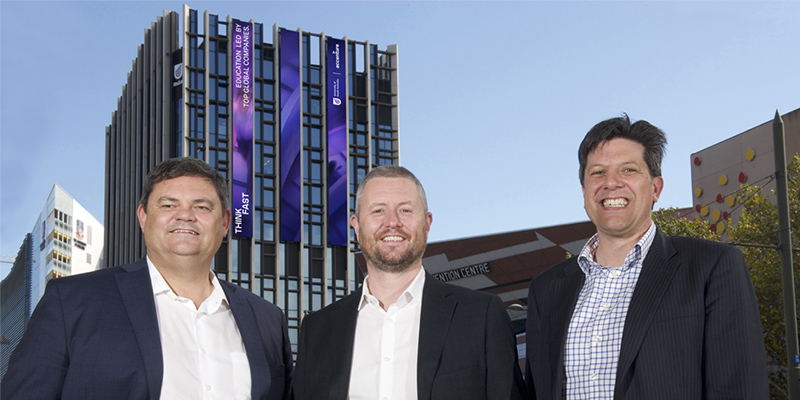How business and universities can work together to solve the tech skills problem
By Accenture Australia & New Zealand Operations Lead Jordan Griffiths
 BUSINESS AND LAW Accenture Australia and New Zealand CEO Peter Burns, UniSA Vice Chancellor Professor David Lloyd and Accenture Australia and New Zealand Operations Lead Jordan Griffiths.
BUSINESS AND LAW Accenture Australia and New Zealand CEO Peter Burns, UniSA Vice Chancellor Professor David Lloyd and Accenture Australia and New Zealand Operations Lead Jordan Griffiths. While the ‘Hunger Games’ of technology skills that is currently playing out in the market has been well-reported of late, it is not a new issue in Australia. The rapid digitisation of our economy during COVID-19 merely accelerated a problem that was brewing for a long time. Until now, Australian businesses, government, and educational institutions, have not focused enough on equipping Australians for the digital skills they need for the future, preferring to rest on our laurels, and lacking in the sense of urgency and foresight of the ‘digital pandemic’ that was to come.
We have been blessed by what we have in the ground, and it may come as a surprise to some that, according to Accenture research conducted for the Tech Council of Australia (TCA), technology is the third largest industry in Australia, behind mining and banking. We have reached a point where, for Australia to continue a growth trajectory, we must prioritise technology as an economic driver, which means nurturing digital talent domestically as well as attracting international talent.

According to the TCA report, the technology sector alone has the potential to contribute $250bn to GDP by 2030 and create one million jobs in Australia by 2025.
As technology infiltrates every aspect of our economy, the digital skills required to drive this revolution are increasingly in demand. The existing workforce will need to quickly reskill and upskill from different roles, and businesses are already tapping into alternative pathways, such as VET programs, to mine the ‘hidden worker’ market for tech talent and/or potential. Given the rapid pace with which technology is evolving, there will be a need for a constant pivot and adaptation of older and newer digital skills. Older skills will still be needed to manage complex and/or legacy systems, while constantly learning new skills will need to become habitual for cloud natives and companies that are data hungry. Older and newer digital skillsets will need to work in harmony to keep up with the fast-changing business landscape.

Like many traditional institutions, universities must disrupt old ways of learning to deliver contemporary programs, underpinned by technology literacy and digital skills, or risk falling behind.
Collaboration between business and higher education institutions will be critical in creating avenues and opportunities to help close this gap, bolstered by policymaking that will make it easier for all Australians to break into tech sector roles.
Derived from the urgency to enhance domestic digital capability and inspired by Australia’s potential to become a leading digital economy, Accenture, having experienced the impacts of the technology skills shortage first-hand, was eager to take an active role in helping upskill Australia in tech. Joining forces with UniSA, the two organisations combined their world-leading capabilities to establish the Innovation Academy in Digital Business. The Academy delivers bespoke, innovative curriculums and training programs that are designed to address known and emerging skills gaps and enhance productivity in Australia’s strategic growth areas. The Academy’s first offering, the Bachelor of Digital Business program, leverages real-world Accenture material and case studies, while the second offering (a professional development program) focuses on the upskilling and reskilling of established workforces.
To achieve the TCA’s goal of creating one million tech jobs by 2025, maintaining our quality of life and improving our global standing as a digital economy, educational institutions and businesses must work together to deliver digitally driven courses, across all disciplines. We must focus on developing tech leaders through a more industry-focused lens, by incorporating real-world scenarios and practical upskilling activities. As a starting point, universities should be integrating emerging technologies, such as the metaverse and applied intelligence – which are fast being adopted by the workforce, into their learning modules. We are at a critical juncture where universities must transform how they design and deliver education and focus on developing digital professionals with the capability to adapt as technology evolves.
UniSA and Accenture have joined forces to offer a new degree in digital business. Read more about the Bachelor of Digital Business, and the Innovation Academy, on the UniSA website.
Other Stories
- Life-sized cardboard models used to test designs for new Women’s and Children’s Hospital
- How do I improve my motivation to exercise when I really hate it? 10 science-backed tips
- Industry and research join forces to tackle $283 billion antimicrobial resistance threat to Australia
- Hydroponic native plants to detox PFAS-contaminated water
- From the Vice Chancellor
- Achievements and Announcements
- How business and universities can work together to solve the tech skills problem
- Meet Clive, UniSA’s first quadruped robot
- In reality, escapist fiction could be what the doctor orders
- UniSA honours two trailblazing entrepreneurs
- The latest books from UniSA researchers
- In Pictures: 2022 graduation ceremonies




